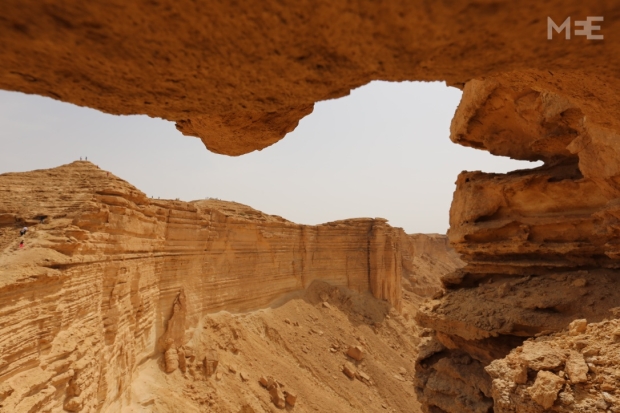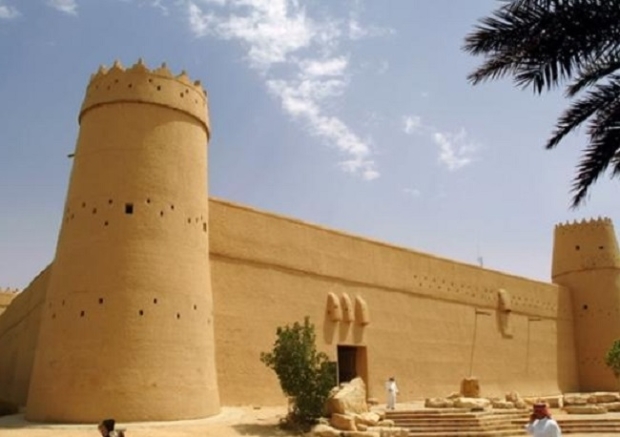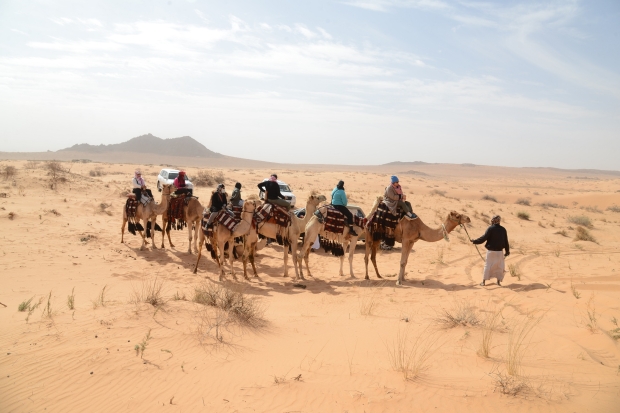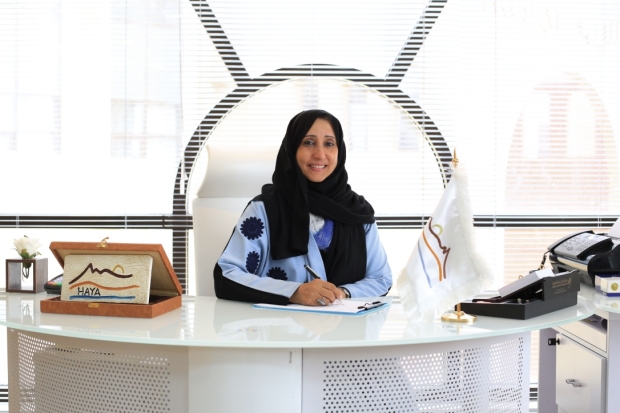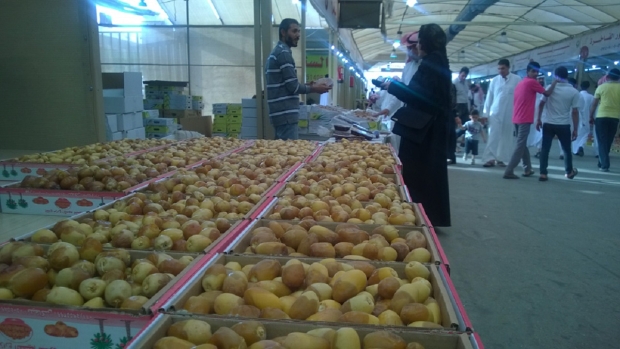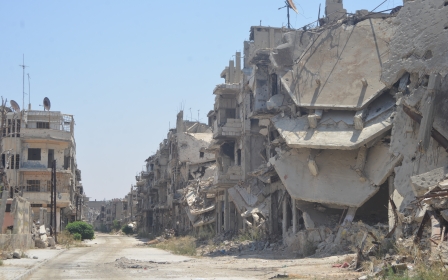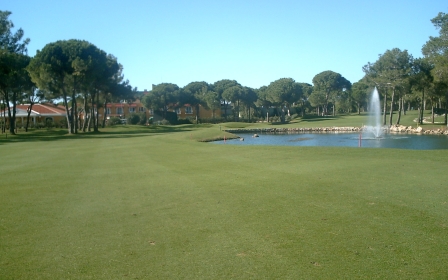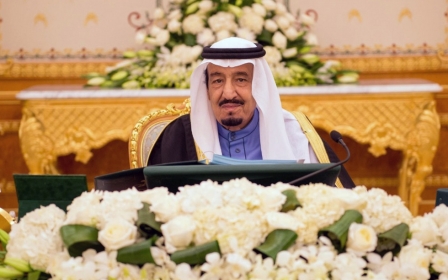One woman’s journey to make Saudi Arabia your next holiday destination
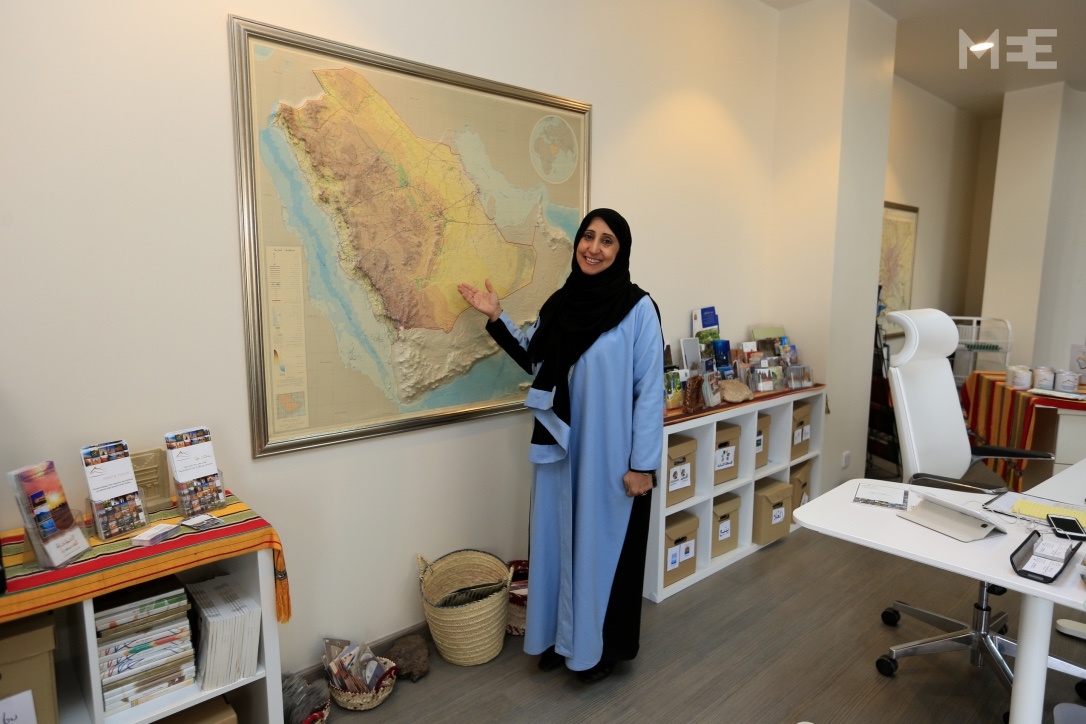
RIYADH - When you think about "holiday destinations," Saudi Arabia probably does not come to mind. But Salwa Hamad, the founder of Haya Tours, is hoping to change that.
Middle East Eye met with Salwa at her new office in Riyadh, which is adorned with beautiful photography, colourful travel brochures, traditional handcrafts, and a "Best Tour Operator" award taking pride of place. It is a far cry from the simple room in her house where her business began six years ago.
Salwa always had a passion for travel and adventure, which started in childhood.
“I read a lot as a child. I read Around the World in 80 Days and I read about travellers like Ibn Batuta. My father would also take us camping each spring. He was from the Eastern Province and my mother’s family was from Taif, so every year we travelled to both places. I learned all the roads and routes between the two.”
Childhood lessons
Salwa was taught to be independent by her businessman father, Hamad Mohamad al-Qunaibit, who stopped giving her money as soon as she started to work. He allowed her to choose her own path in life, as did Salwa’s mother, Moday Hamad al-Olayan.
“My mother was from the generation where women did nothing for themselves because they were not allowed [to] by the tradition. She never went to the supermarket because all she was allowed to be was a mother and a wife. She said to me: "Salwa, you have to be independent. Don’t ask anybody to put money in your hand. You have to make it yourself.’”
Salwa took her mother’s advice to heart and after completing her diploma in computer science, she got a job as a computer programmer in the Saudi Finance Ministry. Yet she felt her work environment stifled her creativity, due to the bureaucracy and reluctance to modernise the old computer systems.
But the job also gave her a lot of free time, which she used to educate herself about interesting places in Saudi.
Breaking from tradition
During her 20 years w3orking in government, Salwa married and had three sons. A friend arranged the marriage, which broke with local tradition, as Salwa decided she would not marry anyone from within her family.
Contrary to the customs of the time, she also requested to see her husband before the marriage and told him that she would not wear the niqab. This is despite the female face-covering being an expected part of the culture throughout most of Saudi Arabia, even today.
“I told him that I wouldn’t cover my face because I don’t like it [the niqab] and I wouldn't stop working either. He agreed because he was open-minded and a kind man.”
A natural guide
At the age of 42, Salwa retired from government and put her time into arranging family vacations to interesting places in Saudi Arabia.
“I would go to the ministry of tourism, get all the maps, hire a bus, collect my sisters, my kids and say, let’s go!”
She went to places like Mada’in Saleh – an archaeological site in the northwest, once inhabited by the Nabateans, who later built Petra in modern-day Jordan.
She also helped her sister, a schoolteacher, arrange field trips to historical places like Masmak fort – a mud brick complex in Riyadh’s old quarter and the site of ibn Saud’s recapture of the city.
Another of her favourite places was the breathtaking cliff face overlooking the Acacia Valley. It is hailed as being the steepest drop in the country and is known as the Edge of the World.
Salwa became an expert in researching, writing schedules and planning logistics. And so becoming a tour operator was a natural, but not easy, transition.
A man’s world
“I wanted to be official and so I applied to the Saudi Commission for Tourism and National Heritage for a tour guide licence. Three months passed and I had no answer, so I called them to ask why. An employee on the phone told me, “Women can’t be tour guides.”
Salwa was not deterred. She had the support of her family and upon her husband’s advice, she applied for a tour "operator" licence instead. But this required her to have an office, which she could not afford, so she rented a small room. But upon inspection, a tourism ministry official told her that the room was too ugly to operate her business from. Frustrated, she headed to the tourism licence head office.
“I was afraid, but I explained everything. After hearing me, they called up the head in the Riyadh office. I think my temperature was 500 degrees! I said to him, it’s my right to have this licence and I asked him to give me six months to prove myself. He said, “I’ll give you one year.” I got the licence!”
From then on, Salwa was unstoppable. She created schedules, making sure her programmes ran on time and in the correct season. “For example, if you want to see the rose festival in Taif you must go in spring.”
Changing Saudi mind-sets
Word of mouth has been her main source of publicity. Various Saudi press agencies have approached her to cover what she does, but she has largely shunned them, fearing that journalists would only focus on her being a woman in a male profession. She wanted to talk about tourism, but the questions she received were about not covering her hair in front of expats.
There were other challenges too. Salwa found that Saudis – who she was most keen to educate - were largely disinterested in the tours. They did not associate Saudi with tourism.
“Many of us have a vary bad image about ourselves and we need to correct it. Maybe they think tourism should only relate to places like Europe, where there is green countryside. I’d like to know the answer as to why they’re not interested. Within six years, I do not understand my own people.”
MEE spoke to a few Saudis about why they did not want to explore more of their own country, and received similar responses along the lines of, “there’s nothing to see here”. Another Saudi tour operator explained why he thought the locals were disinterested in visiting Saudi’s heritage and beauty sites. He said, in jest, “It’s because there are no shopping malls there.”
Gauging Saudis’ interest continues to be a challenge, which Salwa says can be overcome by education.
The international image of Saudi
For much of the outside world, Saudi is synonymous with human rights abuses. More recently, its been criticised for its role in regional wars. Salwa explained her irritation over things like the driving ban on women, but she is adamant that change is happening and she tells her clients the same.
“Look at me, I’m a woman and I’m working and travelling all around. When I was in government I got the same salary as my male colleagues," she emphasises.
On the subject of Yemen, Salwa conceded she is against all wars and wants a solution. Incidentally, this year saw her first tour cancellation, when an international school called off a visit to an area near the Yemen border, citing security fears.
On the destruction of heritage sites in the name of religion, Salwa said the government does not sanction it and that it is extreme individuals who send out brainwashed young men to do such things. Her solution to this is better education about Islam.
In March 2015, Saudi led a coalition of Arab and Gulf countries in support of Yemen’s toppled government against Shia Houthi rebels. Since then the war has killed more than 7,000 people and wounded nearly 37,000, according to the United Nations.
A promising future for tourism
Despite the controversy associated with Saudi, Salwa was pleasantly surprised to find that expats living there were very interested in her tours, like British teacher Sherrie Roberts.
“We always hear about the restrictions in Saudi, but we don’t hear about the more positive side. Taking part in the Haya Tours, I experienced true Saudi hospitality and saw some amazing landscapes. I went to the date festival, the falcon display, the Edge of the World and the camel beauty pageant – that was the first time any women had been allowed to go!”
Client enthusiasm is one of Salwa’s biggest sources of motivation. She now receives requests from international schools, women’s groups, and companies like Aramco, as well as individuals who live in Saudi that want to explore the country with a local.
Salwa also gets hundreds of emails and increasing numbers of requests from groups abroad. But she grapples with government restrictions. Currently, tourism visas are not issued by the government and so Saudi is only really open to those who travel there for work purposes. Salwa says things are changing though.
“Until now, the government hasn't opened the country up for tourism, but I believe they will. It will just take time.”
It seems she may be right. Last month King Salman pledged to engage in archaeological excavations alongside French teams. The government has also promised to invest in the tourism sector, as part of King Salman’s 2030 vision to diversify the Saudi economy away from oil.
In the meantime, Salwa awaits the opportunity to extend her passion for educating people about her country’s beauty, history, culture and heritage. She invites you to see “the real Saudi”.
This article is available in French on Middle East Eye French edition.
New MEE newsletter: Jerusalem Dispatch
Sign up to get the latest insights and analysis on Israel-Palestine, alongside Turkey Unpacked and other MEE newsletters
Middle East Eye delivers independent and unrivalled coverage and analysis of the Middle East, North Africa and beyond. To learn more about republishing this content and the associated fees, please fill out this form. More about MEE can be found here.


